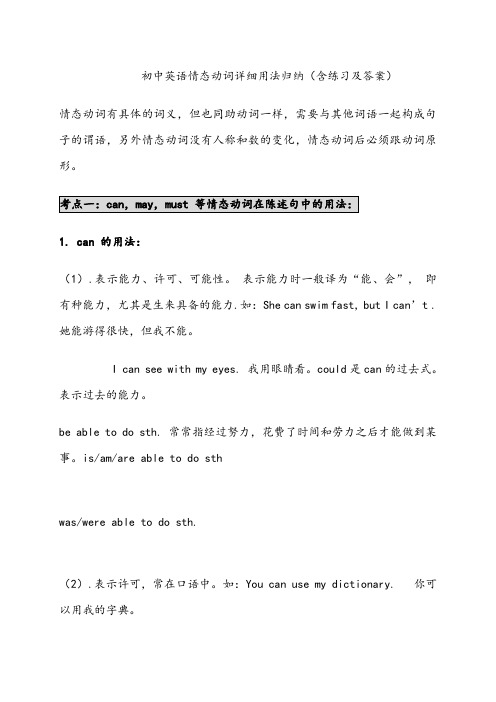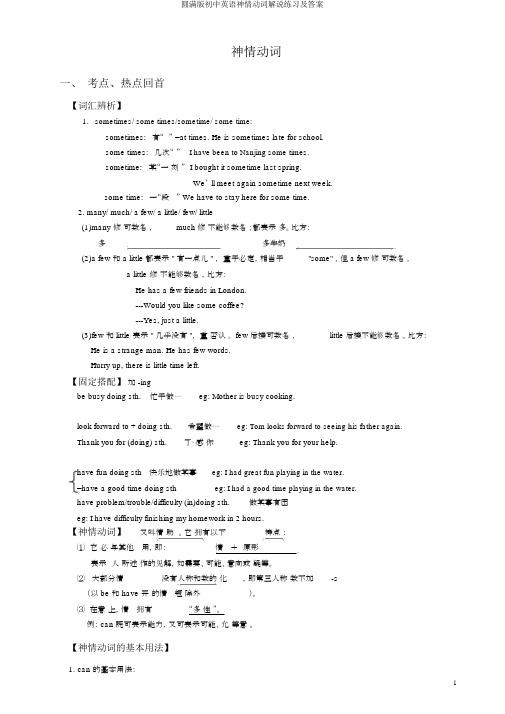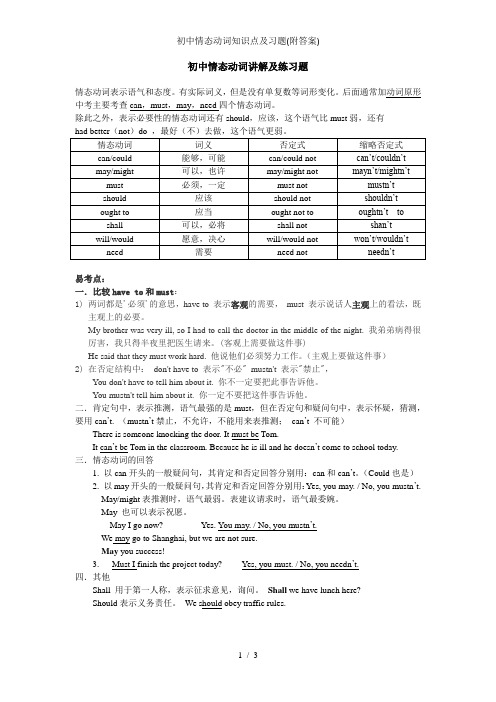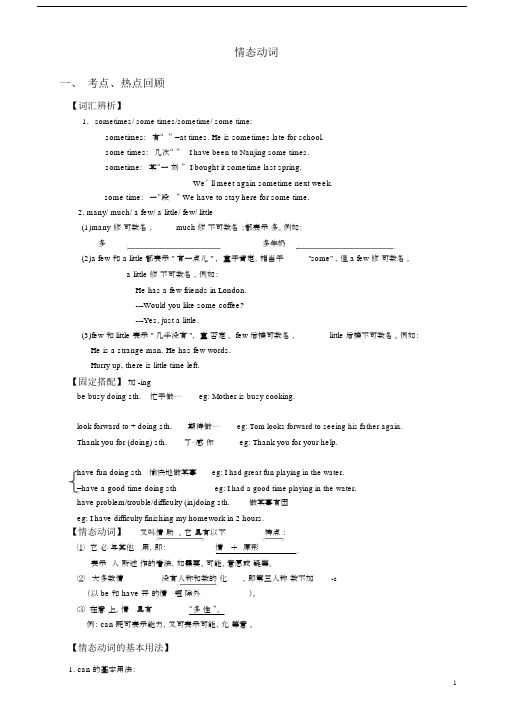初中英语语法情态动词讲解与练习有答案
初中英语情态动词详细用法归纳(含练习及答案)

初中英语情态动词详细用法归纳(含练习及答案)情态动词有具体的词义,但也同助动词一样,需要与其他词语一起构成句子的谓语,另外情态动词没有人称和数的变化,情态动词后必须跟动词原形。
1. can 的用法:(1).表示能力、许可、可能性。
表示能力时一般译为“能、会”,即有种能力,尤其是生来具备的能力.如:She can swim fast, but I can’t . 她能游得很快,但我不能。
I can see with my eyes. 我用眼睛看。
could是can的过去式。
表示过去的能力。
be able to do sth. 常常指经过努力,花费了时间和劳力之后才能做到某事。
is/am/are able to do sthwas/were able to do sth.(2).表示许可,常在口语中。
如:You can use my dictionary. 你可以用我的字典。
(3).表示推测,可能性,意为“可能”,常用于否定句和疑问句中,此时can’t 译为“ 不可能”。
如:Can the news be true 这个消息会是真的吗—Can it be our teacher那个人有可能是我们老师吗—No, it can’t be our teacher. He is on a visit to the Great Wall.不可能。
咱们老师正在游览长城呢。
【例题】—I think Miss Gao must be in the library. She said she would go there. —No. She __be there, I have just been there. ’t ’t ’t ’t【解析】根据下文“我刚去过那儿”可知,应为“ 不可能”,can’t 表示推测[答案] Acould的用法:(1).can的过去式,意为“ 能、会”,表示过去的能力。
如:He could write poems when he was 10. 他十岁时就会写诗。
完整版初中英语情态动词讲解练习及答案

神情动词一、考点、热点回首【词汇辨析】1.sometimes/ some times/sometime/ some time:sometimes:有“ ” =at times. He is sometimes late for school.some times:几次“ ”I have been to Nanjing some times.sometime:某“一刻” I bought it sometime last spring.We’ ll meet again sometime next week.some time:一“段” We have to stay here for some time.2. many/ much/ a few/ a little/ few/ little(1)many 修可数名,much 修不能够数名;都表示多。
比方:多多牛奶(2)a few 和 a little 都表示 " 有一点儿 " ,重于必定,相当于"some" ,但 a few 修可数名,a little 修不能够数名,比方:He has a few friends in London.---Would you like some coffee?---Yes, just a little.(3)few 和 little 表示 " 几乎没有 ",重否认。
few 后接可数名,little 后接不能够数名。
比方:He is a strange man. He has few words.Hurry up, there is little time left.【固定搭配】加 -ingbe busy doing sth.忙于做⋯⋯eg: Mother is busy cooking.look forward to + doing sth.希望做⋯⋯eg: Tom looks forward to seeing his father again.Thank you for (doing) sth.了⋯感你eg: Thank you for your help.have fun doing sth快乐地做某事eg: I had great fun playing in the water.=have a good time doing sth eg: I had a good time playing in the water.have problem/trouble/difficulty (in)doing sth.做某事有困eg: I have difficulty finishing my homework in 2 hours.【神情动词】又叫情助。
初中情态动词知识点及习题(附答案)

初中情态动词讲解及练习题情态动词表示语气和态度。
有实际词义,但是没有单复数等词形变化。
后面通常加动词原形中考主要考查can,must,may,need四个情态动词。
除此之外,表示必要性的情态动词还有should,应该,这个语气比must弱,还有易考点:一.比较have to和must:1) 两词都是'必须'的意思,have to表示客观的需要,must 表示说话人主观上的看法,既主观上的必要。
My brother was very ill, so I had to call the doctor in the middle of the night.我弟弟病得很厉害,我只得半夜里把医生请来。
(客观上需要做这件事)He said that they must work hard.他说他们必须努力工作。
(主观上要做这件事)2) 在否定结构中:don't have to 表示"不必" mustn't表示"禁止",You don't have to tell him about it. 你不一定要把此事告诉他。
You mustn't tell him about it. 你一定不要把这件事告诉他。
二.肯定句中,表示推测,语气最强的是must,但在否定句和疑问句中,表示怀疑,猜测,要用can’t. (mustn’t禁止,不允许,不能用来表推测;can’t 不可能)There is someone knocking the door. It must be Tom.It can’t be Tom in the classroom. Because he is ill and he doesn’t come to school today.三.情态动词的回答1. 以can开头的一般疑问句,其肯定和否定回答分别用:can和can’t。
初三上册初中语法英语情态动词讲解含答案

初三上册初中语法英语情态动词讲解含答案一、选择题1.—I prefer western food. It’s delicious and good for us.—_______ ? But western food is said to be high in sugar and fat.A.Is that right B.How do you know thatC.Do you really think so D.Who told you that2.—Are you going to offer some masks and alcohol wet wipes (酒精湿巾) to the people in the village?—________ They are in great need of these things.A.What a shame! B.Why not? C.Why me? D.What's wrong? 3.—Oh, no! There isn't any salt left.—____________! I’ll buy some when I go into town.A.Good idea B.Go ahead C.Never mind D.Not at all 4.— I find it difficult to fall asleep before exams. Could you help me?— ___________. We have helped many students with similar problems.A.No problem B.Come on C.Well done D.What a pity 5.—I’m afraid I can’t get good grades in the P.E. exam.—________! Train as much as you can.A.Well done B.Keep trying C.Enjoy yourself D.Be careful 6.—________.—It’s a pleasure.A.Don’t worry about the task B.Thank you for showing me aroundC.Be careful when you travel D.You’d better get up now7.—I thought I’d try to repair the car myself.— __________ ! You know nothing about the car.A.No way B.You can’t be serious C.I couldn’t agree more D.Don’t change a thing8.— I am so sorry to keep you waiting for such a long time.— ________.A.Please shut up B.It’s your mistake C.It doesn’t matter D.Don’t explain it 9.—I’m afraid I can’t do well in the sports meeting. I might let my classmates down.—_______. You don’t need to push yourself too hard.A.It’s a pleasu re B.What a pity C.Take it easy D.You’re welcome 10.– Would you like me to lock the door?– _______A.Yes, I’d like to.B.It’s a pleasure.C.Yes, please. D.It doesn’t matter. 11.—Amazingly, I've managed to finish the project by myself.—___________I told you it was easyA.With pleasure. B.Guess what? C.There you are! D.It doesn’t matter 12.—The game is too hard for me. I will certainly lose.—________. You should never say no before you try.A.Forget it! B.Come on! C.I’m sorry.D.Pardon me? 13.—I’m sorry. That wasn’t of much help.— ________. In fact, it was most helpful.A.Thanks anyway B.It doesn’t matter C.Of course not D.Sure it was 14.—Don’t forget to keep safe distance (距离) at least one meter, Mike!—________A.Sorry, I won’t.B.No, I can’t do it.C.Not at all. D.I hope not. 15.-Do you think the rain will stop tomorrow?-_____. It has rained for four days. It’s too wet everywhere.A.I hope not B.I don’t think soC.Don’t worry D.I hope so16.— Could you please clean your room?—_________. I’ll do it at on ce.A.Yes, sure B.Sorry, I can’t C.It doesn’t matter D.Here you are 17.-Do you mind telling me how to use this function? - . It’s easy. Just double-click on the “Pencil” icon.A.No, not at all B.Of course, I doC.Yes, I do D.Yes, I don’t18.—Would you please help me with my spoken English?—__________. First you should know practice makes perfect.A.That’s right B.No problem C.Quite well D.No, thanks 19.— Shall we go to Nanjing Green Expo Park to enjoy the beautiful flowers this afternoon?— ________. Let’s go there by bike.A.I think so B.That’s all right C.My pleasure D.Sounds great 20.—I have got a new job as a presenter in the Wenzhou Radio Station!—________.A.Come on B.Good idea C.Congratulations D.All right 21.—Sir, this is your order, two chicken hamburgers and a cup of coffee. ________—I’ll have them here.A.For here or to go? B.Something to drink? C.Anything else? D.Is that OK? 22.—You seem so happy today, Jack.—________? I won the first prize in the singing competition yesterday.A.So what B.How come C.Guess what D.Why not 23.—________. Where’s the nearest supermarket?—Oh, it’s about 300 meters away, next to a park.A.Thank you B.Excuse me C.Come on D.That’s OK 24.—Anna, can you come to my party tomorrow night?—_________, but I have to stay at home because of the flu.A.I’d love to B.Sounds good C.That’s OK D.Why not25.--Would you like to go shopping with me on Saturday?-- . I have to help my mother with housework.A.I’m afraid not B.Take your timeC.Enjoy yourself D.That’s all righ t26.—Many people think women are better at cooking than men.—________. Most top chefs in the world are men.A.I agree B.I can’t agree more C.Not at all D.That’s not the case 27.—Could you help me look after my baby ________ I am away?—________.A.as; With pleasure B.while; My pleasure C.as; That’s all right D.while; With pleasure28.—How would you like your soup?—________.A.Very delicious B.With some tomatoes and eggs, pleaseC.I like it very much D.No, thanks29.—Time is up. I have to go now.— ________ ! We don’t have more time to talk.A.That’s cool B.That’s the answer C.That’s a pity D.That’s good news 30.—Don’t keep the water running when you brush your teeth.— ________ .A.I hope so B.I’m afraid not C.Sorry, I won’t D.It’s nothing 31.—How do you find the documentary DA VID Profile(国宝档案).—________. I can’t think too highly of it.A.It all depends B.It’s really wonderfulC.No one knows for certain D.It is not my cup of tea32.—I find it really unwise to go travelling during May Day holiday.—________! Wherever you go, it’s crowded with cars and people.A.Not exactly B.Forget it C.You said it D.It depends 33.—Only those who have a lot in common can get along well.—________ Opposites sometimes attract.A.I think so. B.I don’t think so.C.I don’t care. D.I hope so. 34.—How do you like coffee, Minnie?—It tastes very terrible. ________.A.I have no idea B.I don’t mind it C.I really can’t stand it D.I can’t afford it 35.— Mr. Smith, I won the first prize in the competition.—______ I think you’ll do better and better.A.Congratulations! B.Good idea! C.That’s all right!D.What a shame! 36.— May I have a look at the newspaper China Daily?— Certainly. ________A.Thank you. B.It’s a pity.C.Here you are. D.I’d like to. 37.—I’m afraid I can’t find th e key to the car.—______. I’ll wait for you. We have enough time.A.Hurry up B.All rightC.It is up to you D.Hold your horses38.—________!—Yes. It sounds gentle and relaxing.A.How good the vegetable soup is B.How exciting the storybook isC.What nice music Ann is playing D.What a beautiful flower Jim keeps 39.—All of Mark Twain’s novels are popular.— ________. Especially The Adventures of Tom Sawyer.A.I can’t agree more B.That’s not the case C.That’s not the point D.Don’t mention it 40.—I’ll be away on a business trip. Would you mind looking after my cat?—Not at all. ________.A.It’s my pleasure B.I’d rather not.C.I’d like it.D.With pleasure. 41.—Thank you for helping to build hospitals during this special period.— ________ ! Many hands make light work.A.My pleasure B.All right C.Never mind D.None of my business42.—I visited the Purple Mountain Observatory by myself last Saturday.—________ Why didn’t you tell me earlier?A.You did? B.I hope not. C.Have a good time. D.I can’t believe it. 43.—Our school football team has won the first prize in the match!—________A.Have a good time. B.Nice work. C.Never mind. D.Good luck. 44.—Mum, Joe has broken a cup!—________. Accidents always happen.A.Pretty good B.Of course C.It doesn’t matter D.That depends 45.— The movie Lost in Russia sends a message about the importance of family.— ________. It reminds me of my parents.A.I hope so B.That’s all right C.You bet D.I don’t think so 46.— The dress I got is not the same color as that is shown online.—________? But if so, I promise we will send you another one.A.How come B.Who knows C.What for D.Why worry 47.— Are you feeling any better now after taking the medicine?—________. I’m feeling even worse.A.You got it B.Never mind C.Sorry to hear that D.Quite the opposite 48.—Another Friday! Let’s go to see the play tonight.—________ I will book the tickets online.A.My pleasure. B.That’s right.C.Why not? D.Never mind. 49.—I just got a message from Ms. Yang and she said she would come to our meeting this afternoon.— She always has good ideas.A.Why not? B.What a pity! C.Time is up. D.That’ll be very nice. 50.— Mike, are you ready for the coming final exam?— ________. I have prepared it for weeks.A.You bet B.No deal C.Bad luck D.Have fun【参考答案】***试卷处理标记,请不要删除一、选择题1.C【详解】句意:——我更喜欢西餐。
完整版初中语法英语情态动词讲解含答案

完整版初中语法英语情态动词讲解含答案一、选择题1.When you visit a museum, some instructions should ________ and we’d better not ________ them.A.pay attention to; be against B.be paid attention; againstC.be paid attention to; against D.be paid attention to; be against2.To my joy, we_________ go to the bank. Mary has lent us some money.A.shouldn’t B.needn’t C.couldn’t D.wouldn’t 3.—Who’s singing next door? Is it Miss Wang?—It ________ be her. She’s having the board meeting.A.can’t B.shouldn’t C.mustn’t D.needn’t4.It’s of gr eat importance to protect the environment. Each of us ________ take an active part in it.A.can B.may C.would D.should5.—Do we have to finish this today?—Yes, you ________ . Today is the last day.A.would B.may C.can D.must6.Sorry, smoking is not allowed here. If you ________ , you will be fined according to the rules. A.can B.will C.may D.must7.—The high school entrance examination is coming!— Yes, our teacher tells us we ________ be too careful while taking exams.A.mustn’t B.shouldn’t C.needn’t D.ca n’t8.—Will my car be ready by the end of the day?—It ________ be, sir. I’ll call if there’s any problem.A.must B.could C.shall D.should 9.—Dad, must we wait until the light becomes green?—Yes, I am afraid we ________. That’s the traffic rule.A.may B.can C.have to D.need10.—________ you give me a hand? I can’t put up the poster by myself.—No problem.A.Could B.Should C.Need D.Must 11.Exercise is helpful but it ________ be regular (规律的) exercise.A.must B.may C.can D.need12.—I don’t care what people think.—Well, you _______ . Some opinions are worth weighing.A.should B.might C.could D.would13.You'd better __________ hard from now on, __________ you will fail the exam. A.work; and B.working; or C.working; and D.work; or 14.—________ I see your ID card? We have to check your personal information.—Sure. Here you are.A.May B.Need C.Should D.Must15.I ________ hear you clearly. Would you please repeat it?A.mustn’t B.can’t C.needn’t D.shouldn’t16.A lot of online resources ________ be used either by teachers at school or parents at home. A.can B.should C.need D.must 17.Please don't make so much noise. I ________ hear the speaker very well.A.needn't B.can't C.shouldn't D.mustn't 18.—The high school entrance examination is coming!—Yes, our teacher tells us we _______ be too careful while taking exams.A.mustn't B.shouldn't C.needn't D.can't19.We’ve discussed every detail of this plan and have got everything ready. But still something __________ go wrong. We still have to be very careful.A.must B.should C.would D.may20.You ______ pay too much attention to your pronunciation, as it is so important in the oral (口头的) test.A.shouldn’t B.mustn’t C.can’t D.needn’t21.My bike was broken yesterday,so I____walk home.A.might B.had to C.must D.could22.— Ready? Let’s get started, Martin.— Swimming? I just ________ get used to it in winter.A.can’t B.needn’t C.mustn’t D.shouldn’t 23.Dr. Zhong Nanshan once said, "To prevent the spread of this disease, we________never be too careful."A.can B.may C.must D.should 24.Think twice before making a decision, or you __________ get into trouble.A.may B.can't C.shouldn't D.mustn't25.You ________ write the report again because spelling mistakes are not allowed at all. A.must B.can C.may D.could26.—In China, many parents complain that their children have to stay up late to do the homework.—Don’t worry. The government has realized the problem. I’m sure there ________ be good news soon.A.can B.should C.need D.must 27.—Could I join you in the programme?—Sorry, you ________. You are too young.A.shouldn’t B.mustn’t C.can’t D.needn’t28.—I must go to school today, ________?—No, you ________.You can go as soon as you get well.A.mustn’t I;needn’t B.needn’t I;needn’tC.mustn’t I;mustn’t D.needn’t I;mustn’t29.—How do you like my new dress?—Well, if I ________ say, it is not suitable for you.A.may B.must C.have to D.should30.— Excuse me, could you tell me where the Nanjing Brocade Museum is?—Go along this road for five minutes. You ________ miss it. It’s a huge building.A.mustn’t B.can’t C.needn’t D.shouldn’t 31.—Why didn’t you tell it to me earlier?— Why ________ I? I want to have my own secret.A.can B.may C.should D.shall32.—What is that young lady’s job?—She ________ be a nurse, I’m not sure.A.must B.may C.need D.would 33.According to the rule, used batteries ________ be dropped in the red bin for harmful wastes. A.may B.would C.should D.might34.You _________ smoke here! Look at the sign. It says "No smoking".A.needn't B.mustn't C.can D.may35.— Listen! Tom ________ be listening to the music while doing his homework.—Let’s go upstairs to remind him to turn it off.A.should B.could C.would D.must36.Most young people like shopping online because they ________ spend much time going from shop to shop.A.needn’t B.can’t C.mustn’t D.shouldn’t37.We teenagers ________ have dreams. With dreams and hard work, anything amazing________ be created.A.may; can B.might; should C.should; can D.must; has to 38.—Will Jim come to Yangzhou for a holiday?—He ________come and it depends on how much homework he will have.A.may B.should C.must D.need39.—Is it really necessary for me to go shopping with a mask on?—I’m afraid you ________ in public. It is not only to protect yourself but also to protect others. A.must B.should C.can D.need40.—Is it usually warm in Yancheng in May?—Yes. But it _______ be rather cold sometimes.A.must B.should C.would D.can41.— Is the boy over there Tom? He often wears a jacket like that.— It _______ be him. He is absent from school today.A.ne edn’t B.shouldn’t C.mustn’t D.can’t42.You ________ pay too much attention to protecting yourself if you plan to go abroad.A.mustn’t B.can’t C.shouldn’t D.needn’t 43.—Seventy dollars for such a dress! You ________ be joking!—I’m serious. It’s made of sil k from Hangzhou.A.must B.need C.will D.can44.Look at the floor, Tom! ________ you watch TV while having a meal?A.Should B.Could C.Must D.May45.Cars ________ give way to walkers on some roads in Binhai, or the drivers will be fined. A.may B.will C.can D.must 46.—Could you tell me how to renew the library books?—With pleasure. You ________ come to our desk every time. It’s easier to renew them online. A.can’t B.mustn’t C.needn’t D.shouldn’t 47.For the safety of the passengers, objects like guns ________ be carried on board.A.may not B.needn’t C.might not D.mustn’t48.—In China, many students have to stay up late to do their homework.—No worries. The government has realized the problem. I’m sure there ________ be good news soon.A.can B.should C.must D.need 49.—Who’s the man over there? Is that Mr. Black?—It ________ be him. Mr. Black is much taller than that man.A.may B.must C.can’t D.mustn’t50.— Mum, why do I have to wash hands so many times a day?—You ________ be too careful, for your health.A.c an’t B.mustn’t C.may not D.needn’t【参考答案】***试卷处理标记,请不要删除一、选择题1.D解析:D【详解】句意:当你参观博物馆时,应该注意一些说明,我们最好不违反它们。
(完整版)初中英语情态动词讲解练习及答案.doc

情态动词一、考点、热点回顾【词汇辨析】1.sometimes/ some times/sometime/ some time:sometimes:有“ ”=at times. He is sometimes late for school.some times:几次“ ”I have been to Nanjing some times.sometime:某“一刻”I bought it sometime last spring.We’ ll meet again sometime next week.some time:一“段”We have to stay here for some time.2. many/ much/ a few/ a little/ few/ little(1)many 修可数名,much 修不可数名;都表示多。
例如:多多牛奶(2)a few 和 a little 都表示 " 有一点儿 " ,重于肯定,相当于"some" ,但 a few 修可数名,a little 修不可数名,例如:He has a few friends in London.---Would you like some coffee?---Yes, just a little.(3)few 和 little 表示 " 几乎没有 ",重否定。
few 后接可数名,little 后接不可数名。
例如:He is a strange man. He has few words.Hurry up, there is little time left.【固定搭配】加 -ingbe busy doing sth.忙于做⋯⋯eg: Mother is busy cooking.look forward to + doing sth.期待做⋯⋯eg: Tom looks forward to seeing his father again.Thank you for (doing) sth.了⋯感你eg: Thank you for your help.have fun doing sth愉快地做某事eg: I had great fun playing in the water.=have a good time doing sth eg: I had a good time playing in the water.have problem/trouble/difficulty (in)doing sth.做某事有困eg: I have difficulty finishing my homework in 2 hours.【情态动词】又叫情助。
初中英语情态动词详细用法归纳含练习及答案

初中英语情态动词具体用法归纳〔含练习及答案〕情态动词有具体的词义,但也同助动词一样,须要及其他词语一起构成句子的谓语,另外情态动词没有人称和数的改变,情态动词后必需跟动词原形。
1. 的用法:〔1〕.表示实力、答应、可能性。
表示实力时一般译为“能、会〞,即有种实力,尤其是生来具备的实力.如:, I ’t . 她能游得很快,但我不能。
I . 我用眼睛看。
是的过去式。
表示过去的实力。
. 经常指经过努力,花费了时间和劳力之后才能做到某事。
.〔2〕.表示答应,常在口语中。
如: . 你可以用我的字典。
〔3〕.表示推想,可能性,意为“可能〞,常用于否认句和疑问句中,此时’t 译为“ 不行能〞。
如: ? 这个消息会是真的吗?— ?那个人有可能是我们老师吗?—, ’t . a .不行能。
咱们老师正在巡游长城呢。
【例题】—I . . —. , I . ’t ’t ’t ’t【解析】依据下文“我刚去过那儿〞可知,应为“ 不行能〞,’t 表示推想[答案] A的用法:〔1〕的过去式,意为“ 能、会〞,表示过去的实力。
如: 10. 他十岁时就会写诗。
〔2〕. 在疑问句中,表示委婉的语气,此时没有过去式的意思。
如a ? 你能帮我个忙吗?— I ? 我能用一下你的钢笔吗? —, .可以。
〔用问,不能用答。
〕2. 的用法:〔1〕.表示恳求、答应,比正式,如: I ? 我可以借你的自行车吗? . 如今你可以回家了。
【例题】— I 3? — . . A. D.【解析】在此处表示恳求,意为“ 做……可以吗〞。
答案:A(2) .表示推想,议论可能性,意为“ 可能,或许〞,一般用于确定句中。
如: . 明天可能会下雨。
. 她可能在家呢. 翻译为“可能不〞(3) 的过去式为,表示推想时。
可能性低于。
如: . .他分开学校了,可能是他生病了。
(4) . 表示盼望、祈求、祝福,常可译为“祝福〞。
通常是用 +主例如: a . 祝你过得开心。
! 祝你华蜜!!祝你胜利!3. 的用法:(1) 表示主观看法,意为“必需、确定〞。
中学英语情态动词用法归纳精华版(含练习和答案).doc

情态动词有具体的词义,但也同助动词一样,需要与其他词语一起构成句子的谓语,另外情态动词没有人称和数的变化,情态动词后必须跟动词原形。
1.can的用法:(1).表示能力、许可、可能性。
表示能力时一般译为“能、会”,即有种能力,尤其是生来具备的能力.如:She can swim fast, but I can't.她能游得很快,但我不能。
I can see with my eyes.我用眼睛看。
could是can的过去式。
表示过去的能力。
be able to do sth.常常指经过努力,花费了时间和劳力之后才能做到某事。
is/am/are able to do sthwas/were able to do sth.(2).表示许可,常在口语中。
如:You can use my dictionary. 你可以用我的字典。
(3).表示推测,可能性,意为“可能",常用于否定句和疑问句中,此时can't译为“不可能"。
如:Can the news be true?这个消息会是真的吗?一Can it be our teacher?那个人有可能是我们老师吗? —No, it can't be our teacher. He is on a visit to the Great Wall.不可能。
咱们老师正在游览长城呢。
【例题】一I think Miss Gao must be in the library. She said she would go there. —No. She —be there, I have just been there. A.can't B.mustn't C.needn't D.wouldn't【解析】根据下文“我刚去过那儿”可知,应为“不可能”,can、表示推测[答案]Acould的用法:(1).can的过去式,意为"能、会“,表示过去的能力。
- 1、下载文档前请自行甄别文档内容的完整性,平台不提供额外的编辑、内容补充、找答案等附加服务。
- 2、"仅部分预览"的文档,不可在线预览部分如存在完整性等问题,可反馈申请退款(可完整预览的文档不适用该条件!)。
- 3、如文档侵犯您的权益,请联系客服反馈,我们会尽快为您处理(人工客服工作时间:9:00-18:30)。
情态动词在句中放在谓语动词之前,谓语动词前若有助动词,则在助动词之前,疑问句中,情态动词放在主语之前。
I can see you. Come here. 我能看见你,过来吧。
He must have been away. 他一定走了。
What can I do for you? 你要什么How dare you treat us like that! 你怎么敢那样对待我们!三.情态动词的特点情态动词无人称和数的变化,情态动词后面跟的动词需用原形,否定式构成是在情态动词后面加“not”。
个别情态动词有现在式和过去式两种形式,过去式可以用来表达更加客气、委婉的语气,时态性不强,可用于过去,现在或将来。
我们称之为“功能用法”。
He could be here soon. 他很快就来。
May I come in? 我可以进来吗?May I use your dictionary? 我可以用你的词典吗?You may put on more clothes. 你可以多穿点衣服。
He said he might lend us some money. 他说他可以借给我们一些钱。
may 否定式为 may not, 缩写形式是mayn’t。
might 是may 的过去式,有两种用法,一种表示过去式,一种表示虚拟语气,使语气更加委婉、客气或对可能性的怀疑。
He told me he might be here on time. 他说他能按时间来。
Might I borrow some money now? 我可以借点钱吗?He might be alive. 他可能还活着。
3. must “必须;应该;一定;准是”,表示说话人认为有必要做某事,命令、You needn't have taken it seriously. 这件事情你不必太认真。
5. dare “敢”,多用在否定或疑问句中。
The little girl dare not speak in public. 小女孩不敢在公众面前说话。
Dare you catch the little snake? 你敢抓小蛇吗?dare 除用作情态动词外,更多的是当实义动词使用,用法同实义动词一样,要考虑人称,单复数,时态等。
Do you dare to walk in the dark? 你敢黑夜走路吗He doesn't dare to tell the teacher what happened that day. 他不敢告诉老师那天发生的事。
6. ought “应当;应该”,后面跟带有 to 的动词不定式。
You ought to read these books if you want to know how to repair the mo torcar. 如果你想知道如何修理汽车,你应该读这些书。
2)表示应该、必须,常与must 换用。
e.g. a. We should (must) master a foreign language at least.3).should 表示劝告,建议,命令,此时也可用ought to. 在疑问句中,通常用should代替 ought to.4) should have done 表示过去应该做而实际没有做should not have done 表示过去不该做而实际做了.9. have to&must1) 两词都是'必须'的意思,have to 表示客观的需要, must 表示说话人主观上的看法,既主观上的必要。
e.g. a. My brother was very ill, so I had to call the doctor in the mi ddle of the night. (客观上需要做这件事)b. He said that they must work hard. (主观上要做)2) have to有人称、数、时态的变化,而must只有一种形式。
但must 可用于间接引语中表示过去的必要或义务。
e.g. a. He had to look after his sister yesterday.3)在否定结构中:don’t have t o 表示“不必” mustn’t表示“禁止”e.g. a. You don‘t have to tell him about it.b. You mustn‘t tell him about it.10.need&dare这两词既可做实义动词用,又可做情态动词用。
作为情态动词,两者都只能用于疑问句,否定句和条件句。
need 作实义动词时后面的不定式必须带to,而dare作实义动词用时, 后面的to 时常可以被省略。
1)实义动词:need+ n. / to do sth2)情态动词: need,只用原形need后加do,否定形式为need not。
We would have finished this work by the end of next December.明年十二月底前我们很可能已完成这项工作了。
The road is wet. It must have rained las t night.地是湿的,昨天晚上一定下雨了。
4)情态动词+动词的现在完成进行时。
表示对过去正在发生事情的推测。
Your mother must have been looking for you.你妈妈一定一直在找你。
5)推测的否定形式,疑问形式用can't, couldn't表示。
Mike can't have found his car, for he came to work by bus this morning. 迈克一定还没有找回他的车,因为早上他是坐公共汽车来上班的。
注意:could, might表示推测时不表示时态,其推测的程度不如can, may。
九.情态动词+ have +过去分词1) may(might) have + done sth, can (could) have + done sth表示过去,推测过去时间里可能发生的事情。
Philip may (might) have been hurt seriously in the car accident.Philip can (could) have been hurt seriously in the car accident.2) must have +done sth,对过去时间里可能发生的事情的推测,语气较强,具有"肯定","谅必"的意思。
---Linda has gone to work, but her bicycle is still here.---She must have gone by bus.3) ought to have done sth, should have done sth.本应该做某事,而事实上并没有做。
否定句表示"不该做某事而做了"。
You ought to (should) have been mo re careful in this experiment. He ought not to have thrown the old clothes away.(事实上已扔了。
)ought to 在语气上比should 要强。
4) needn't have done sth 本没必要做某事二.提高深化(有答案)1( ) 1 John___ come to see us tonight, but he isn't very sure yet.A. mayB. canC. has toD. must( ) 2 They ___ do well in the exam.A. can be able toB. be able toC. can able toD. are able to( ) 3 -May I take this book out?-No, you___.A. can'tB. may notC. needn'tD. aren't( ) 4 You___ go and see a doctor at once because you're got a fever.A. canB. mustC. dareD. would( ) 5 -Can you speak Japanese?-No, I____.A. mustn'tB. can'tC. needn'tD. may not2( ) 1 -He___ be in the classroom, I think.-No, he ___ be in the classroom. I saw him go home a minute ago.A. can; may notB. must; may notC. may; can'tD. may; mustn't( ) 2 -Shall I get one more cake for you, Dad?-Thanks, but you___, I've had enough.A. may notB. must notC. can'tD. needn't( ) 3 Even the top students in our class can't work out this problem, so it?????? be very difficult.A. mayB. mustC. canD. need( ) 4 He isn't at school. I think he ___ be ill.o A. can B. shall C. must D. has to( ) 5 ___ I take this one?A. MayB. WillC. AreD. Do3( ) 1 The children___ play football on the road.A. can'tB. canC. mustn'tD. must( ) 2 You ___ be late for school again next time.A. mustn'tB. needn'tC. don't have toD. don't need to( ) 3 -Must I do my homework at once?-No, you___.A. needn'tB. mustn'tC. can'tD. may not4( ) 1 His arm is all right. He___ go and see the doctor.A. has not toB. don't have toC. haven't toD. doesn't have to( ) 2 He had to give up the plan, ___ he?A. didB. didn'tC. doesD. doesn't( ) 3 They had to walk here, ___ they?A. mustn'tB. didC. didn'tD. hadn't5( ) 1 He had better stay here, ___ he?A. didn'tB. don'tC. hadn'tD. isn't( ) 2 You'd better___late next time.A. not to beB. not beC. won't beD. don't be( ) 3 You'd better ___ your hair ___ once a month.A. had; cutB. had; cuttedC. have; cutD. have; cutted( ) 4 You___ ask that man over there. Maybe he knows the way.A. had better not toB. had not betterC. had betterD. had better not 6( ) 1 -Shall we go and visit the History Museum next Sunday?A. Here you areB. Sorry, I can'tC. Yes, pleaseD. Let me try( ) 2 -Why don't you ask Mike to go with us?-Thanks, ___.A. I willB. I won'tC. leanD. I may( ) 3 -___ I take the newspaper away?-No, you mustn't. You____read it only here.A. Must; canB. May; canC. Need; mustD. Must; must参考答案:1. 1-5 A D A B B2. 1-5 C D B C A3. 1-3 C A A4. 1-3 D B C5. 1-4 C B C C6. 1-3 B A B。
